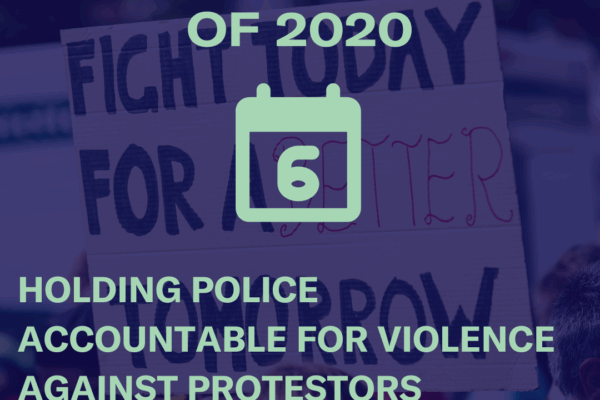The past year has brought multiple crises – from the continued murder of Black people by law enforcement, to the direct and collateral harms of COVID-19, to systematic efforts to restrict the fundamental right to vote, and more.
Thanks to ACLU supporters like you, we stood ready to face these crises – and we are ready for whatever comes next.
For the rest of this month, we invite you to tune in as we share some of our accomplishments from the past year. While we achieved many successes in 2020, much work remains before we can consider South Carolina a state where We the People means everyone. Thank you for being part of this work.
Read more about this work:
Holding Police Accountable for Violence Against Protestors
On Sunday, May 31, 2020, a group of people protesting against police violence and for racial justice gathered in Marion Square in Charleston. They were met with a force of police that looked ready for war, clad in riot gear and flanked with an armored personnel vehicle. The police carried weapons that are banned under the laws of war, yet still permitted on the streets of South Carolina.
We were there that Sunday, acting as legal observers.
We witnessed law enforcement from at least five different law enforcement agencies respond to peaceful protest with violence.
Let us be clear. The violence we witnessed came from law enforcement itself. We observed as police officers actively pursued peaceful protestors, making arrests and firing projectiles and chemicals. The brutality we witnessed matches additional complaints we have received from individuals in Charleston and other parts of South Carolina. These actions were clear, dangerous, and counterproductive responses to people exercising their Constitutional rights.
This was not an anomaly. This is how policing was designed to work.
Throughout American history, our laws and political leaders have protected the oppressor over the oppressed — from punishing abolitionists instead of slave owners, to punishing opponents of mass incarceration and police violence instead of those who perpetuate it.
Police historically have been, and continue to be, a key mechanism for enforcing many of these racist and exploitative policies. The earliest example of organized city policing actually emerged in Charleston, where a professional force of white free people formed to maintain control of Black enslaved people living inside the city, to prevent them from organizing. This force was an entity whose explicit purpose was to maintain a racist social order against the will of whom it policed — it was a slave patrol. With the abolition of slavery, the role of police shifted from protecting the institution of slavery to protecting the revised political and economic hierarchy, with white people still the oppressor. This regime included enforcing some of the earliest versions of voter suppression, including poll taxes. In the decades since, police have enforced policies designed to exploit and destroy Black communities – from convict leasing, to Jim Crow, to the war on drugs.
Today, political leaders continue to use racist dog whistles like "law and order" and "tough on crime" to convince many that it is safer and smarter to prioritize policing and incarceration rather than things that will actually improve public safety and health, like ensuring all people have a roof over their head, comprehensive healthcare, a living wage, and quality public education.
Today, political leaders continue to use police to carry out their oppressive policies that undermine public safety and destroy Black lives and communities. Our political leaders have turned police into society's "solution" for drug use, misbehaving children at school, homelessness, mental illness and protests against these destructive policies, to name just a few.
Since May 31 we have worked to hold the Charleston Police Department and other agencies present that day accountable.
- On June 2, we sent each law enforcement agency present (who we could identify through the riot gear), a letter documenting the police violence that we witnessed. Law enforcement’s response, if there was one, was dismissive at best.
- On July 29, we sent a second letter to the Charleston Police Department (CPD). In this letter we also documented the numerous ways in which CPD violated its own internal policy.
- In response to CPD’s internal “Afteraction Report” of its response to the uprising in Charleston on May 30 and 31, we, along with partners at South Carolina 4 Criminal Justice Reform, sent a third letter to CPD documenting the factual inaccuracies and omissions, selective use of inflammatory and passive language, refusal to protect the constitutional right to protest, and violations of CPD’s internal policies.
There is a stark difference between the image and reality of law enforcement in South Carolina. Seven months after numerous law enforcement agencies brutalized people protesting police brutality in Charleston, the agencies still refuse to hold themselves accountable. This willful neglect further undermines the community’s trust in the law enforcement and is yet another reminder that we must support the movement to redefine and reinvest in true public safety.
Our call is simple. Law enforcement leaders must apologize for their brutal response and outline the steps they will take to hold their officers accountable and ensure their officers respect and protect the fundamental right to protest.
In a society that prizes government transparency and accountability, it should be easy for law enforcement to prioritize and respond to these asks. The fact that they are not is yet another example of why we must fundamentally rethink the role that policing should play in our society.
This work is part of an ever-growing movement to redefine public safety in South Carolina. With our partners, we will continue to build a South Carolina that is safe and just for all.

